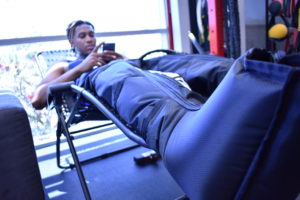This is a conversation I have with a lot of my clients. It is also a subject when it comes to youth athletes as well. Some individuals have a long warm up process, in excess of half an hour to forty five minutes. Some individuals don’t warm up at all, they go into the gym and start cranking out the days workouts. Here’s my opinion, some scientific basis and why I believe it matters.
A good warm up will help prepare your body for what you are about to ask of it.
Here are the major reasons for including a good warm up before your workout.
- Prepare the mind
- Prepare the body
- Injury risk reduction
- Performance improvement
I think that preparing your mind for activity and tasks at hand in today’s workout is a very overlooked piece of the puzzle. Depending where you were before the workout or game, your mind may be in a very different place than the present. A good warm up allows you to let everything else fall to the background and get you focused on what you need to do to make it a successful workout or game.
A good warm up will also help prepare your body for what you are about to ask of it. Warming up raises your core temperature, heart rate, joint viscosity, breathing rate, and blood flow to your more active muscles and joints. This helps to improve stiffness and mobilize key joints and ranges of motion that will be used in the workout or game. It is also key to introduce the movements that you will use in today’s workout or game; e.g. sport specific motions or squats; whatever you will be focusing on that day.
A good warm up allows you to let everything else fall to the background and get you focused on what you need to do to make it a successful workout or game.
Warm up programs have specifically been proven to reduce the risk of injury, as well as, the severity of injury. One of the most extensively researched and put together programs is the FIFA 11+; developed by researchers in Oslo and Zurich. This is a program that was put together to lower the rates of non-contact injury in youth soccer players. The program has been studied extensively and articles on it’s efficacy have been published in the British and American Journals of Sports Medicine, as well as, other established publications.
In addition to being studied for injury risk mitigation, warm up programs have been studied for effects on performance. It should come as no surprise that benefits include: improved neuromuscular control, improved balance, faster muscle contraction, improvements in rate of force development (power), and improvements in reaction time. Obviously, a warm up isn’t going to turn you from NONja to ninja but it can have an impact on your game or workout that day.
Now that the benefits of a warm up have been stated, here are my tips on what a warm up includes.
- Begin with something that raises your HR but that is sub max
- Technique work
- Cuts, planned change of directions drills
- Row, run, swim intervals
- Work light to mod activation drills and sport specific movements
- Band work
- Balance work
- Hopping, skipping, jumping drills
- Mobility drills
- Squats and lunges
- Spinal motion in all directions
Obviously, a warm up isn’t going to turn you from NONja to ninja but it can have an impact on your game or workout that day.
- Ramp to game ready
- Plyometrics
- Higher intensity intervals
- Reactive agility drills
As always, I hope this helps! If you have any questions or would like to read about certain topics, send us an email at TeamSP@SportsPerformancePT.com.
-Dr. Nick Schroeder, PT, DPT
For more tips on optimizing athletic performance FOLLOW US on:
- Instagram: http://www.instagram.com/SportsPerformancePT
- Facebook: http://www.facebook.com/SportsPerformancePT
- YouTube: http://www.youtube.com/c/SportsPerformancePT











